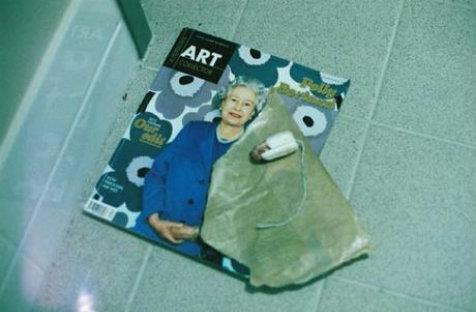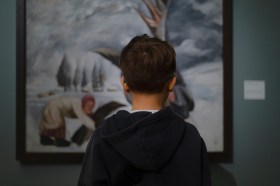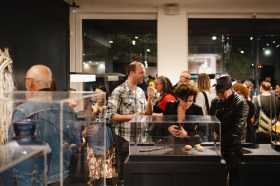The installation of found objects that comprises Erika Scott’s exhibition no wonder inspires multiple themes of duality. Amidst the broken and bubbling fish tanks that are centrally scattered in the space, domestic relics sit faded and obscure while live crickets chirp in a duet of the chaotic and the calm.
More than once in this exhibition I am reminded of the duality of life and death – a theme that possesses its own oppositions of darkness and light, on and off, preservation and decay. These oppositions are subtly embedded into Scott’s work: the fish tanks sit alongside such objects as a preserved pufferfish, a spider encased in resin, a plastic toy skeleton, and a framed picture of the word ‘mysteries’. Though mysterious on their own, collectively these objects communicate the intention of understanding the cycle of life and the importance of memory. Stepping through the maze of fish tanks, signs of life are intertwined with memories that have been created, lost, and remembered.
While the themes of Scott’s exhibition may seem dark, there is a lightness and frivolity in the use of the battered fish tanks. These are not just empty vessels, but uninhabited houses that once flourished with aquatic life, temporarily admired, loved, and cherished. The glass of fish tanks offers a protective shield, keeping our world separate from that submerged in water. Now empty and retired on the gallery floor, the fish tanks act as histories of what once was, reflecting their own water world while finally, as empty tanks, becoming part of our own in the open air.
Beyond the clustered fish tanks, the gallery space turns into a forest of synthetic dusters, their rainbow fibres bright against the white gallery walls. Like the fish tanks, these objects have been transformed from the utilitarian to artefacts of memory, reminiscent of the dust-inducing activity of the busy households in which they once belonged. For Scott, the permanence of memory supersedes the impermanence of utility, and the stages of life, death and decay are only the beginning of an after-life of thought, revision, and remembrance.
no wonder
By Erika Scott
Metro Arts, Brisbane
12 – 29 June





